The Stream
Hiiro Tale
by Bamboo Dong,

Let's dive in, shall we?
 #1 - Kids on the Slope [ep. 4-5]
#1 - Kids on the Slope [ep. 4-5]There is something intangible about Kids on the Slope that makes it so heartwarming and inspirational. Episode after episode, I find my heart opening up to the characters. When they fight with each other, I fervently wish for them to make up, and when they're happy and playing music with one another, I feel like I've been transported to a time and place where only warm, fuzzy feelings reside.
In a recent episode of Kids on the Slope, I cried for the first time this series when Kaoru visited his mother, who left him and his father when he was young. I've been blessed in that I've never had to deal with anything like that in my life, but even so, the series is written so delicately and so truthfully that you can resonate with the characters' emotions. As his subway car pulled out of the station, with his mother's face disappearing behind him, I felt a pang of homesickness towards my own family, which mingled with the good feelings left behind by the series. It was a bittersweet feeling, and I cherish the ability of Kids on the Slope to be able to tug on the heartstrings of its viewers so candidly.
There's a great moment during Kaoru's visit when he tells his mother about what's been plaguing him—the feeling of despondency and depression he feels from being rejected by Ritsuko. The mother launches into a peal of laughter, and tells him that he's just feeling lovesick. The two share a laugh, and in that moment, the audience is right there with them.
I've said before that Kids on the Slope feels nostalgic to me, but I couldn't quite place my finger on where that feeling comes from. The more I watch the series, the more I realize that it's because everything is so deftly written that every scene invokes memories inside the viewer. Maybe you haven't experienced the exact same thing that's happening on the screen, but the emotions are pulled out and prodded, and that translates to a viewing experience that's much more intimate than one normally receives from an anime series.
 Status: Kids on the Slope has yet to misstep, and I'm very much looking forward to continuing the rest of the season.
Status: Kids on the Slope has yet to misstep, and I'm very much looking forward to continuing the rest of the season.
 #2 - Space Brothers [ep. 5-8]
#2 - Space Brothers [ep. 5-8]If Space Brothers was rewritten with any lead character besides Mutta, it wouldn't be as good of a show. Mutta absolutely sells the series, from his lovable quirks and unheroic attitude, to his omnipresent insecurity about being the washed up older brother. He's such a nontraditional hero that he becomes a champion for the everyman, allowing viewers to step into his shoes with minimal effort. The most recent string of episodes shoves Mutta into the unlikely spotlight when he accidentally captures a criminal that's been eluding the cops. He questions whether or not he should fess up to what really happens, but changes his mind when he sees an opportunity to impress some ladies. That storyline never would've happened if Hibito was the main character, and as a result, the series would be much less entertaining, and much less interesting.
Although some may be turned off by the slow and deliberate pace of Space Brothers, I find that it still packs plenty of tension and suspense. The cliffhangers in this series are brutal, and even though one expects things to work out, it's frustrating how well this show is able to dangle you over a plot precipice. It's just very good at setting things up in a way where viewers already start anticipating an event episodes before it occurs. It allows the audience to really get into Mutta's headspace, and by the time the big event happens (usually interrupted by a cliffhanger), we're ready to jump.
Of all the new characters this season, I'm loving Mutta the most. He's the most flawed, but also the most relatable, and I think anime could do with more characters like him.
 Status: Absolutely loving this show. I don't mind in the least that the series is taking its sweet time resolving whether or not Mutta will become an astronaut. I don't think Space Brothers is about that at all, and I'm loving getting to know Mutta and his family as he goes through this transition in life.
Status: Absolutely loving this show. I don't mind in the least that the series is taking its sweet time resolving whether or not Mutta will become an astronaut. I don't think Space Brothers is about that at all, and I'm loving getting to know Mutta and his family as he goes through this transition in life.
 #3 - Tsuritama [ep. 4-5]
#3 - Tsuritama [ep. 4-5]Just as people love rooting for the underdog, you invariably want to root for Yuki, whose stress-induced demon face is incredibly endearing in animated form, but likely terrifying in real life. As he gets more enamoured with fishing, you can almost see the anxiety melt away from him, and it's liberating to see that transformation unfold.
After falling in love with fishing, he decides he wants to invest in a fishing pole, but is dismayed at the high prices. To help pay for his new hobby, he takes a summer job working on a deep sea fishing boat. He's nervous at first, especially when he's faced with a few setbacks, and especially when he's put in charge of snagging the first fish, but opens up immensely when he learns to push through his hang-ups and reach success. It's amazing how a “show about fishing” can be so emotionally satisfying to watch—when Yuki catches his first fish, my heart leapt for joy. After all, Tsuritama has never really been just a fishing show, and episode seven really shines in its ability to showcase Yuki's changing personality.
That having been said, Tsuritama is definitely a show that could not only appeal to sport fishing enthusiasts, but also draw in a few more amateurs. It explains the sport in great detail, giving information about not only the equipment and techniques, but also various strategies for catching fish. It doesn't just stop there, though—Tsuritama is a treasure trove of rich details, even down to the painstaking location research. A few weeks back, someone in the forums linked to a friend's blog, who had visited Enoshima and subsequently posted side-by-side comparisons of Tsuritama screenshots with their real-life counterparts. It only makes one appreciate the series even more.
For those who haven't found a show to follow yet this season, I highly endorse Tsuritama. It is beautiful and joyous, not only visually but also emotionally, and it lifts spirits. One of Yuki's line in particular made me smile: “I was surprised by how loudly I learned to laugh.”
 Status: Definitely keeping this one high on the list. Tsuritama is an absolute pleasure to watch, and I encourage all to check it out.
Status: Definitely keeping this one high on the list. Tsuritama is an absolute pleasure to watch, and I encourage all to check it out.
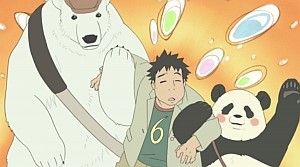 #4 - Polar Bear Cafe [ep. 5-7]
#4 - Polar Bear Cafe [ep. 5-7]Polar Bear Cafe is rapidly becoming one of the shows I look the most forward to every week. After several episodes, it's really hit its comedic stride, which might be the nudge that new viewers need to finally hop into the pool. Blending cute and absurd in a unique way, it consistently delivers laughs, and I can almost guarantee that it'll plaster a smile on your face. Episode six follows Panda's quest to lose weight and become more bad-ass, while episode seven follows the characters as they embark on various romantic escapades—Mr. Handa gets a makeover lesson from Panda, while Penguin goes on a practice date. And wouldn't you know, the rising star is Polar Bear, who bolsters his traditional pun-based humor with some self-deprecating laughs, like squeezing himself into a rubber fetish suit, and putting on a wig and playing Penguin's date. Considering Polar Bear is traditionally one of the more reserved characters in the series, it was an unexpected surprise.
I had an exchange on Twitter regarding Polar Bear Cafe that made me stop and think about the show. Someone had asked why I liked the show, saying that they didn't understand the appeal of anthropomorphized animals. After reading that, I realized that I had never really considered the characters to be truly anthropomorphic. For starters, yes, the animals can do “human” things like talk and interact with society, but they still retain their animal characteristics to the point of being cheekily self-aware. When Panda bemoans his physique, the others point out that he is, after all, just a panda, and the origins of his name even reference his chubbiness. The fact that he works at a zoo, giving visitors “service” in the form of playing on playsets, is made extra funny because it's what one would expect of a panda in our normal, everyday world. That the animals walk and talk make them seem more just like regular citizens of a place in which such things are commonplace, not unlike the mingling of alien species in Star Wars, or the smattering of animals in Redline.
Understandably, some viewers might be put off at the idea of watching a series called Polar Bear Cafe, but it's really worth giving a chance. Not only is the humor surprisingly refined, but the cuteness of the characters plays into the viewing experience rather than detracting from it. Episode after episode, Polar Bear Cafe has me wanting to see more.
![]() Status: Give this show a chance, folks. It's a lot funnier than you'd expect, and it appeals to a much wider audience than you'd assume.
Status: Give this show a chance, folks. It's a lot funnier than you'd expect, and it appeals to a much wider audience than you'd assume.
 #5 - Fate/Zero [ep. 17-19]
#5 - Fate/Zero [ep. 17-19]Holy crap, this series is intense. I don't even know where to begin. If ever I bemoaned during the first season that things were slowing down, I take everything back. Fate/Zero has stepped over every boundary I thought the series would set, and every minute has been brutal and shocking. The Holy Grail War has reached a fever pitch, and the characters are dropping like flies. There have been scenes so vicious that I've gasped out loud, and scenes so harsh that I've despaired for the characters.
And even through it all, Fate/Zero has stayed its course, and shown that even in series in which action is exploding in every corner, what matters most is effective storytelling and atmosphere building. As the Holy Grail War is crescendoing to a massive finale, the series still finds time to hang back and explore some of the characters' pasts. There's a two episode flashback that follows a younger Kiritsugu as he lives through tragedy after tragedy, and while I was initially itching for the series to get back to the present day, I felt rewarded at the end of the arc. Fate/Zero knows that it doesn't have to rely on just action to entertain, and I've come to appreciate that it's willing to shake things up for the good of the story.
I'm really glad this series is on air this season, and I will be sorry when it ends.
![]() Status: I hate to say to someone, “You should really watch this 20+ episode show from the beginning!” but the series is really paying off in a good way. So you should.
Status: I hate to say to someone, “You should really watch this 20+ episode show from the beginning!” but the series is really paying off in a good way. So you should.
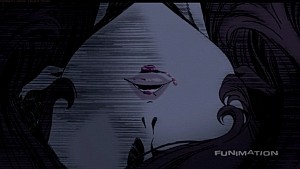 #6 - Lupin III - The Woman Called Fujiko Mine [ep. 5-6]
#6 - Lupin III - The Woman Called Fujiko Mine [ep. 5-6]If there is anything to be said about Lupin III: The Woman Called Fujiko Mine, it is that it's excruciatingly beautiful. From the lithe character designs and the avant garde shading techniques, to the swirls of color that accompany every scene, The Woman Called Fujiko Mine is like a painting come to life. Comparatively, the preceding Lupin III works feel like Saturday morning cartoons—not in content, but in the jovial designs that Monkey Punch has made the world adore. It isn't to say that the designs in Lupin III: Fujiko Mine are objectively better—just that they're different, and that they're a visual treat.
The series is also incredibly sensual, to the point where it's a little uncomfortable at times. As much as I enjoy Fujiko's confidence and command of her sexuality, even I was a little shocked at the episode where she infiltrates an all-female boarding school as a teacher and begins seducing the students. Eventually, it was revealed that one of the students wasn't quite the person she claimed to be, but up until that point, it still felt scandalous.
But that's what I like about this series. Every episode feels very different, and I never feel as though I'm watching different iterations of the same episode. If one watches enough Lupin III movies, they start to blend together a bit, but I haven't yet experienced that with this new series, which still throws me for a loop every episode. To be truthful, yes, they all involve Fujiko simpering at the camera and releasing a billowy bosom, but the stakes are different every time, and the cast of supporting characters (in this case, Lupin and his buddies) rotates with more frequency.
It's not the type of series that needs to be vigorously followed every week, but it's a good go-to show, where you know it'll be good every time, and you'll always enjoy yourself. For that, it's worth the price of admission.
![]() Status: I actually enjoy following Fujiko's side of the story, in that it keeps the three-man circus of Lupin and his pals at bay. Don't get me wrong—I love Lupin et al, but the spontaneity in which they appear makes it more of a treat, rather than part of an algorithm.
Status: I actually enjoy following Fujiko's side of the story, in that it keeps the three-man circus of Lupin and his pals at bay. Don't get me wrong—I love Lupin et al, but the spontaneity in which they appear makes it more of a treat, rather than part of an algorithm.
 #7 - Sankarea [ep. 1-3]
#7 - Sankarea [ep. 1-3]Zombies are okay, I guess. They amble around and kind of moan menacingly, but that's pretty much the end of their shtick. Chihiro, however, absolutely loves zombies, and dreams of someday hooking up with a zombie girl. I'm not sure how the logistics of that tryst would work out, unless someone brought along a mouth guard and a can of Lysol, but for Chihiro, the romantic aspect comes in the doe-eyed pleas of the zombie girl asking him to spare her.
Obsessed with zombies in every facet of his life, he gets the chance to try reanimation first hand when his beloved pet Babu dies. Rather than face the tragedy of knowing that something can be alive one minute and dead the next, he pulls out an old necromancer book and sets to work. Along the way, he meets a beautiful girl whose familial issues lead her to attempt to kill herself by drinking Chihiro's resurrection juice, and the zombie shenanigans begin. That the series manages to be funny, despite its dark roots, is testament to the writing staff. With the excellent characterization and the tongue-in-cheek humor that permeates the series, Sankarea deserves all the praise that it's been garnering. The fact that the main character even harbors romantic fantasies towards zombies is an example of the offbeat humor, and it's able to maintain the balance consistently over at least the first few episodes. I don't know how this show will pan out in the long-run, but right now, I'm excited that it's entered the Spring lineup and I'm looking forward to watching future episodes.
![]() Status: It's a late contender, but Sankarea is a ton of fun. It's a little dark and grotesque at times, but its wit is razor sharp and the script carries itself well.
Status: It's a late contender, but Sankarea is a ton of fun. It's a little dark and grotesque at times, but its wit is razor sharp and the script carries itself well.
 #8 - Eureka 7 AO [ep. 1-4]
#8 - Eureka 7 AO [ep. 1-4]Taking place a couple decades after the original Eureka 7, this sequel follows the life of a boy named Ao, who happens to be Eureka's son. Unfortunately, she's since disappeared, and through a series of circumstances and fortuitous accidents, Ao has discovered his ability to activate a robot called the Nirvash. However, such discoveries don't come unnoticed or appreciated, and he finds that he's quickly cast as a scapegoat for events that happened in the past. He makes the choice to join Generation Bleu in an attempt to track down his mother, and figure out more of regarding his origin.
Like the original series, Eureka 7 AO is plenty fun, and plenty scrappy. It feels slightly disjointed at times, especially during scene transitions, but as a flying robot show, it delivers the goods. I've always had a soft spot for flying mechs, and I find that when I'm watching this series, that part of me rises to the surface. I think as more is revealed about Ao's past and Eureka's whereabouts, the series will crescendo into something more substantial, but for the time being, it's plenty of fun.
![]() Status: It's been quite some time since I've watched Eureka 7, but I found myself still able to enjoy this series. I would hazard to guess that even if you're not familiar with the original, you could jump in and have a good time.
Status: It's been quite some time since I've watched Eureka 7, but I found myself still able to enjoy this series. I would hazard to guess that even if you're not familiar with the original, you could jump in and have a good time.
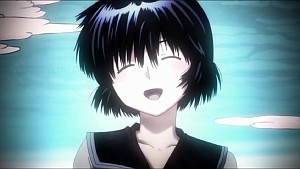 #9 - Mysterious Girlfriend X [ep. 4-6]
#9 - Mysterious Girlfriend X [ep. 4-6]I'm really glad I'm not in high school anymore. Hell, I'm really glad I'm not in my early 20s anymore. Relationships in those years are full of trial and error, and plenty of awkwardness, and nothing quite encapsulates that like Mysterious Girlfriend X. Only this series takes things to the next level with a few more obligatory emotion-transferring saliva swaps.
Admittedly, to Western viewers, the social importance that the Japanese place on given names versus surnames is pretty foreign. With the exception of always addressing our teachers and professors by their titles and surnames, we don't really have an equivalent stigma attached to our names (though I do remembering tittering as a first grader when we excitedly discovered that dear Mrs. Roberts indeed had a first name). As such, I can't one hundred percent relate to Akira's hang-up over asking Urabe's permission to call her by her first name—but I can relate two hundred percent to the awkwardness of young relationships. Surely, I can get a hearty “Amen!” from readers who've been through other awkward relationships of their own. Maybe the circumstances are different, and there probably isn't a whopping spit fetish involved, but relationships are relationships, and sometimes they can be weird.
I think once I realized that, in a strange way, I could relate to Akira's misadventures with Urabe, I started opening up to the series. I still cringe and pull away when a finger goes into someone's mouth, but I appreciate Akira's side of the story. Just watching him fumble over his words and asking Urabe for her permission to take her picture, or dealing with her inconsistent affection, makes me appreciate the way the series depicts their stilted relationship. And like I said, I would never go back to those tender years. Once is enough.
![]() Status: I have to admit that I'm warming up to this series. I still have hang-ups, of course, but I'm enjoying the very relatable aspects of Akira's attempts at puppy love.
Status: I have to admit that I'm warming up to this series. I still have hang-ups, of course, but I'm enjoying the very relatable aspects of Akira's attempts at puppy love.
 #10 - Bodacious Space Pirates [ep. 14-19]
#10 - Bodacious Space Pirates [ep. 14-19]This is a weird thing to say, but I wish Bodacious Space Pirates were a little more sinister. Yes, I love the series for its perpetually happy-go-lucky characters, and the wide-eyed innocence of Marika, but every now and then, the series tries to fake out its viewers by playing slightly more ominous music, only to have it be nothing. Case in point, when Marika loses her ring, it's suspiciously snatched by an unknown hand… only to have it appear later in completely innocuous circumstances. Even when everyone on the Bentenmaru got sick, it was quickly resolved in the most charming way possible.
I like the unrelenting positive vibes that Bodacious Space Pirates effuses, but I am beginning to yearn for a little more drama. Last season, when the pickings were slim, this series stood out beyond the others, but now that it's being overshadowed by other, much better series, I'm starting to see the crack in its walls.
![]() Status: I still love Marika and her positive, upbeat attitude, but I'm craving something more. If true crisis truly befell the Bentenmaru even just once, I think it would make the show vastly more appealing.
Status: I still love Marika and her positive, upbeat attitude, but I'm craving something more. If true crisis truly befell the Bentenmaru even just once, I think it would make the show vastly more appealing.
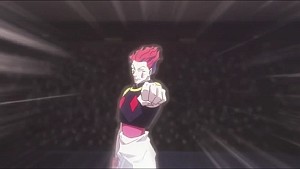 #11 - Hunter x Hunter [ep. 30-31]
#11 - Hunter x Hunter [ep. 30-31]Let it be known that Hisoka might be one of the greatest villains of all time. Several months ago (yes, that's how long we've all been watching Hunter x Hunter now), I made an offhand comment about how I didn't care about the character's whereabouts in the damnable Trick Tower, but I have turned a 180 in my opinion. Hisoka is all at once cool yet terrifying, and any scene with him in it is a scene worth watching.
While Gon is healing from his injury, the scene shifts to another fight at the coliseum, this time between Hisoka and a man named Kastro, whose special ability allows him to create a doppelganger of himself to appear as though he's teleporting. It's immensely satisfying to watch—especially with Hisoka's eerily calm composure—and it goes to show that the series can even be entertaining in episodes that don't feature either Gon or Killua. This is definitely one of those shows that I enjoy every week, and each episode always flies by.
![]() Status: We've been watching this show for a while now, folks, but it's still going strong.
Status: We've been watching this show for a while now, folks, but it's still going strong.
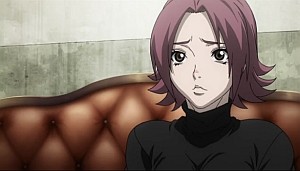 #12 - Zetman [ep. 5-6]
#12 - Zetman [ep. 5-6]This show does not pull any punches at all. It is intentionally hard to watch, and if you don't feel uncomfortable at the end of each episode, then it's possible that you might have missed a scene. In the most recent episodes, Jin continues to figure out what catalyzes his transformation into Zet, and the eventual resolution is not pleasant. Along the way, he finds himself in the middle of a brutal conflict in which one of the monsters has begun harming the people he cares about, and it's definitely hard to watch. There's a scene in which he picks up his friend, whose body is still showing signs of the horror she's had to endure, and it's a scene that takes your breath away with its brutality.
Up until this point, I've been unsatisfied with the pacing of Zetman, as I had felt that it was trying too hard to cram too many things into one season, but I've found myself engaged with the most recent set of episodes. It still has some pacing issues—there's one scene that caused me to roll my eyes when a very time-sensitive scene was interrupted for a few minutes by someone's philosophical ramblings, but it's been much more smooth as of late. The series still has its flaws, but with the undiluted way in which it presents its horrors, I have to respect it.
 Status: Still hanging on. I can't help but love it whenever Zet does appear, and this new red version is definitely stoking my fire.
Status: Still hanging on. I can't help but love it whenever Zet does appear, and this new red version is definitely stoking my fire.
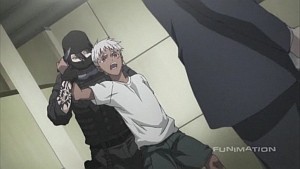 #13 - Jormungand [ep. 4-5]
#13 - Jormungand [ep. 4-5]For all the explosions and hullaballoo that Jormungand usually is, every now and then, there's an episode that's more than just weapons-centric fanservice and the wacky adventures of an eccentric arms dealer and her wacky entourage. Every now and then, there's actually a taste of what I think Jormungand wished it was, which is a harsh, unfiltered look into the seedy underbelly of black market arms. The episode in which Jonan's backstory is revealed is a dozen times better than the episodes buffering it—we get to see how death and killing affect a young boy, and we get to his first wake-up call as to the violent senselessness of revenge.
This episode is much more interesting than most of the episodes of Jormungand combined, and it's a shame that more of the series isn't more like this. Even though Jonah is billed as a main character, he often takes a backseat to endless arms dealing shenanigans, which are shockingly boring for a series with its level of heavy artillery. At this point, I'm willing to keep watching it because I've been lured in with the false promise that the series is capable of better, but I'm not going to hold my breath. Mostly because I have a penchant for falling asleep mid-episode.
![]() Status: Jormungand can be good if it wants to be, but I think it's more than happy just being a gun-toting free-for-all. There's an overarching storyline, but it distracts itself too easily with endless missions.
Status: Jormungand can be good if it wants to be, but I think it's more than happy just being a gun-toting free-for-all. There's an overarching storyline, but it distracts itself too easily with endless missions.
 #14 - Dusk Maiden of Amnesia [ep. 5-6]
#14 - Dusk Maiden of Amnesia [ep. 5-6]Dusk Maiden of Amnesia has been good up until this point as a mixture of comedy and horror, but sometimes the comedy gets a little irksome. It's frustrating to watch the students of the Paranormal Investigations club follow a story thread (the investigation of Yuuko's past, for instance), only to have it constantly interrupted with comedy bits. That's why it's nice when the series can eschew its comedic touches for a while and pull out episodes like the one at the school festival, in which another student tries to stir hysteria into the school members and convince everyone to destroy Yuuko. I've always been fascinated at what happens when large groups of people are driven to paranoia and hysteria, which is perhaps why I was so interested in last season's horror show, Another. That people can be so easily roused into fervor is interesting from a psychological standpoint, and it's always fun and spooky to see it executed well in an anime.
Unfortunately, Dusk Maiden is one of those shows that flies under my radar most of the time, but seeing as how it appears to be going somewhere in terms of the Yuuko storyline, I'm willing to wait it out a couple more episodes.
![]() Status: There must be some kind of rule where every season needs to have a ghost story. I hesitate to call Dusk Maiden a horror anime, since it's comedic most of the time, but I do like it when it gets down and dirty and pulls out the horror stops.
Status: There must be some kind of rule where every season needs to have a ghost story. I hesitate to call Dusk Maiden a horror anime, since it's comedic most of the time, but I do like it when it gets down and dirty and pulls out the horror stops.
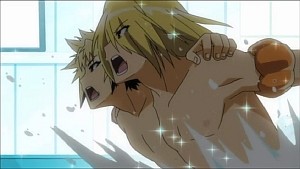 #15 - Medaka Box [ep. 5-6]
#15 - Medaka Box [ep. 5-6]Do people remember the 90s, where a lot of anime character designs had that thing where everyone's eyes resided outside of their hair? Medaka Box has that, and it kind of drives me crazy. I know it pops up every now and again in other shows, but it's so heinous in Medaka Box that the only thing I can stare at is people's giant eyeballs floating outside of their terrible haircuts.
I read somewhere that Medaka Box eventually makes a tone shift and stops being a fluffy high-school-club-does-all-sorts-of-weird-activities show, but that day hasn't come yet. After watching Medaka and her club pals jump through all sorts of hoops in previous episodes, their most recent outing is a swim meet, which will determine which school club will get a higher budget. Only instead of your traditional swimming events, it's more like an aquatic gymkhana. It's about as equally entertaining as the club's previous escapades—no more, no less.
I find shows like Medaka Box to be brutally difficult to review, because very few things happen in every episode. Action-wise, a million things are happening a minute—there are all sorts of races and all sorts of silly contests—but importance-wise, nothing happens. At the end of the day, it's all a mish-mash of outrageous characters doing outrageous things. It's not unlike the types of Japanese variety shows that frequently make the viral video rounds, where contestants have to do something absurd, like slide down a mountain of mayonnaise, or wrestle a tuna from a cat. Only in this scenario, Medaka's club is the contestants, and we are endlessly watching their parade of hijinks.
![]() Status: I am giving this series a few more episodes to shift into something more substantial, but if it keeps going down this rambling path, I may have to cut it out of my life. It's not that it doesn't engage your brain cells for 22 minutes—but that surely, there are more productive things you can do with your 22 minutes than watch what is the equivalent of a hamster running around in a giant wheel.
Status: I am giving this series a few more episodes to shift into something more substantial, but if it keeps going down this rambling path, I may have to cut it out of my life. It's not that it doesn't engage your brain cells for 22 minutes—but that surely, there are more productive things you can do with your 22 minutes than watch what is the equivalent of a hamster running around in a giant wheel.
 #16 - Kuroko's Basketball [ep. 5-6]
#16 - Kuroko's Basketball [ep. 5-6]I've always been a firm believer that the first three quarters of basketball should be disposed of, because it's such a high-scoring game that only the last ten minutes seem to matter. Luckily, with basketball shows like Kuroko's Basketball, only the really important plays matter, and most of the other time that goes by in a game is dispatched when the scoreboard suddenly jumps to higher digits.
Still, I wish Kuroko's Basketball would take a note from other successful sports anime and spend more time on the training sessions and on the strategy sessions leading up to the games. Instead, this series feels like game after endless game, and I'm left wondering how the team prepared for this match-up differently than previous ones. There's a cute scene where the upperclassmen get the freshmen to scramble through the school cafeteria for some sandwiches (endurance training indeed), but aside from that, nothing else is really showcased. I would've liked more time before the game spent on the characters, showing them practicing new techniques or listening to locker room pep talks. There's a reason Friday Night Lights is one of the best sports dramas ever written, and it's certainly not because they play endless games of football.
I did appreciate the flashback scene in which we see a defensive training session with one of the characters, but it was too short-lived, and not encompassing enough of the team as a whole. Kuroko's Basketball is a fun enough sports anime, but it certainly won't join the pantheon of greats.
![]() Status: Still watching this, but I wish it was a little meatier. Watching game after game is cool and all, but it leaves a lot to be desired at the end of the day.
Status: Still watching this, but I wish it was a little meatier. Watching game after game is cool and all, but it leaves a lot to be desired at the end of the day.
 #17 - Upotte!! [ep. 5-6]
#17 - Upotte!! [ep. 5-6]Color me crazy, but I still dig Upotte!. Maybe in a previous life, I lived as a perverted man with an unhealthy lust for school uniforms, but I find Upotte! to be charming and delightful. It's cute and energetic and you get to learn some military strategy along the way.
In the episodes leading up to this mini-arc finale, crazy beans transfer student Sako (named for the Finnish assault rifle SAKO Rk 95 Tp) has plans to take over the school. During the mock battle, in which I'm still not certain what happens if a girl gets shot with a real bullet, she proves to be quite the formidable adversary. However, the other girls stay resilient, and through some perseverance, mud-rolling, and strategy sessions of their own, they prevail and all is saved. All that's left is some run-of-the-mill schoolyard crushes, and you've got a show that isn't quite so different from other high school comedies. Except, you know, the obvious.
The more I watch this show, the more steadfast I am in my resolve that Upotte! is a merchandise show. I can see it becoming wildly popular with not only figure collectors, but also people who like to stuff their house with anime girl tchotskes. The characters are cute and come prepackaged with a shtick, which makes them easily collectible. If that's the series' end game, then I'm a sucker, because I wouldn't mind a few figures of my own.
![]() Status: There's still not much I can say about this show without constantly being on the defensive, but it's cute, bright, and peppy, and I'm enjoying it.
Status: There's still not much I can say about this show without constantly being on the defensive, but it's cute, bright, and peppy, and I'm enjoying it.
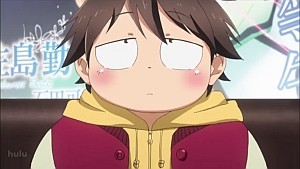 #18- Accel World [ep. 5-7]
#18- Accel World [ep. 5-7]I think in a more low-quality season, Accel World would fare a lot better. Unfortunately, in a season so inundated with material, it also falls under the radar. It's only mistake is that it's not very memorable at all. It has great character designs in the form of hundreds of avatars that populate the virtual world where the characters hang out, and it also puts a lot of thought into various special attacks. I particularly enjoyed the tag team fight between Haru and his bouncer, and two random opponents, whose bulbous designs were a refreshing break from the ever-sleek robotic forms of the Burst Breakers.
Ultimately, my favorite parts of Accel World are the parts that aren't actually in the virtual reality world. While I enjoy the fights, I find the fretting over the leaderboards and the point systems to be tiresome for a game that doesn't actually exist in real life. It's not like a sports anime in which a touchdown actually means something—in a fictional, virtual game, a point is just a qualifier with no real world consequences.
I do, however, enjoy watching the ever-changing interactions between Haru and his friends. The fallout and subsequent patching from his fight with Taku is touching, and it reminds one that despite how strong one can build their avatar or level up their character, ultimately the relationships that you build in real life matter the most. As long as Accel World keeps itself grounded in its human characters, I think it's worth hanging onto.
![]() Status: I don't generally look forward to Accel World every week, which is a strike in its favor, but I find it pleasant enough to watch when I actually sit down and go through it. It's only a lukewarm endorsement, but I'll hang onto it for now.
Status: I don't generally look forward to Accel World every week, which is a strike in its favor, but I find it pleasant enough to watch when I actually sit down and go through it. It's only a lukewarm endorsement, but I'll hang onto it for now.
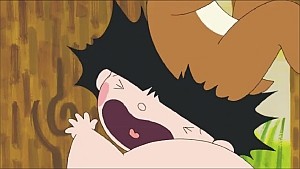 #19 - Folktales from Japan [ep. 5-6]
#19 - Folktales from Japan [ep. 5-6]Maybe this makes me a rube, but I'm done with Folktales from Japan. Don't get me wrong—this show is fine, and it's 85% delightful, but during a season in which there are a myriad of other things to watch, most of the time, you're not in the mood for bedtime stories.
The problem is that, in a show in which each episode has three stories every week, not all of the stories are worth watching. As of late, they've gotten lighter and lighter, to the point where they're no longer fables, and more just the ramblings of a toothy old man. In a recent episode, one of the stories follows this super buff child named Kintarou, who befriends all sorts of woodland creatures. And then he pushes over a tree to make a bridge. If there was a moral somewhere in there, I missed it. The rest of the stories I watched over the past couple of weeks weren't any better, which confirmed my suspicion early on that Folktales from Japan just can't sustain itself long-term.
If there is one thing to laud, it's the show's creative usage of painted media. The backgrounds look like fingerpaintings, and they're delightful to stare at. Perhaps if this were one of those 4-minute-a-week shows, it would work a lot better.
 Status: Dropped. It might be a good babysitting aid in Japan, but here, it doesn't have much to hold one's interest long-term.
Status: Dropped. It might be a good babysitting aid in Japan, but here, it doesn't have much to hold one's interest long-term.
 #20 - Saki Episode of Side A [ep. 1-6]
#20 - Saki Episode of Side A [ep. 1-6]Not being familiar at all with mahjong, for me, watching Saki Episode of Side A is a bit like watching an instructional film in a foreign language without subtitles. I can't understand what the characters are doing, why they're making the moves they're making, how they're winning their games, nor the significance of any of their plays. Having not seen the original Saki series, I don't know if mahjong is better explained there—but if that's the case, then Saki Episode of Side A fails as a standalone series, because it is completely unfriendly towards new viewers.
The problem is not that mahjong is an inherently esoteric game—there have been several successful series based on non-Western games like go and karuta—but that Saki Episode of Side A is not good at illustrating dramatic elements in a user-friendly manner. Even not knowing the game, I should be able to follow the action in easily digestible chunks, and there should be enough non-game material to carry the rest of the story. That's where the series falls short. Aside from the first episode, which is a relatively good character primer despite the awkward time jumps, the series feels light on interpersonal relationships and character development, and heavy on game play.
Even so, the game play itself isn't particularly fun to watch. Not only is it difficult to follow for new viewers, as mentioned before, but the tension isn't elevated enough for major events to feel rewarding. Regardless of the game or sport, every game-changing action needs the proper buildup, whether it's a clutch layup that races against the clock, or a double play that's exaggerated by a slow pan of anxious faces on nervous fans and punctuated with the thunk of a ball hitting a glove. In Saki Episode of Side A, things just happen. People pick up tiles, people swap them around, and numbers are yelled out. If there are game-changers, they're missed.
I've heard good things about the original Saki series, and I've been told by many that I would enjoy it. I can only assume that Saki Episode of Side A is a letdown for Saki fans, as I can't find the enthusiasm for it myself. I'm not sure if you'd file Saki Episode of Side A under “sports,” but as both a sports anime and also a high school drama, it fails.
 Status: Dropped, like a tile softly hitting the smooth velvet of a sturdy mahjong table. I'm confident that even if I knew my mahjong, I'd still like dislike this series, which feels hollow and empty, and disappointingly devoid of both action and emotion.
Status: Dropped, like a tile softly hitting the smooth velvet of a sturdy mahjong table. I'm confident that even if I knew my mahjong, I'd still like dislike this series, which feels hollow and empty, and disappointingly devoid of both action and emotion.
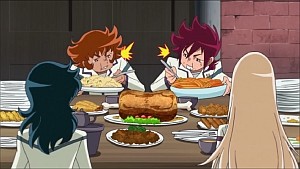 #21 - Saint Seiya Omega [ep. 4-7]
#21 - Saint Seiya Omega [ep. 4-7]So uh… I can't bring myself to really care about this show that much. It's just such a generic hero tale that I feel like I can toss around an offhand comment like, “Well, if you love heroes, then you sure will love Saint Seiya Omega!” And even though that's mostly a joke, it's depressingly true. Saint Seiya Omega is your archetypal hero tale, in which someone finds his true calling for justice, and together, he and his friends band together, embrace friendship, and vanquish evil from the world. Maybe along the way they get some magical ponies or something.
I got to the point where there was an entire episode of arena fighting when I realized that I'm not that emotionally invested in any of the characters, nor in the outcome of the series. I know beyond a shadow of the doubt that our heroes will prevail—even if it means some blood, sweat, and tears along the way—so I don't feel particularly anxious for their well being. I realize that in most shows, yes, the heroes prevail, but I tend to like the ones in which I am sitting on the edge of my seat, wondering how a protagonist will get himself out of a bad situation. When I'm watching Hisoka watch Kastro in Hunter x Hunter, I am on pins and needles waiting to see how he'll fight back. When I'm watching a couple of fluffy-haired meatheads beat each other up in Saint Seiya Omega, I wonder what I'm going to be eating for dinner.
I know that Saint Seiya has tons of fans all around the world, but I don't think it's for me. I'm not saying it's a bad show, or that it's any worse than the shows I'm continuing with, but that I don't think I have it in me to watch more than one super shonen show a season, and my dance card is already full. But hey, if you love heroes, then you sure will love Saint Seiya Omega!
 Status: Dropped, because life is too short to continue doing something you don't really love. In my case, it's watching Saint Seiya Omega.
Status: Dropped, because life is too short to continue doing something you don't really love. In my case, it's watching Saint Seiya Omega.
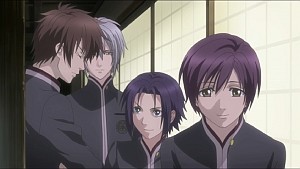 #22 - Hiiro no Kakera [ep. 5-6]
#22 - Hiiro no Kakera [ep. 5-6]I'm not a Japanese expert or anything, but I'm pretty sure Hiiro no Kakera directly translates to Awkward Pauses with Quirky Men. That is, after all, the best way to describe the show. Every episode is just poorly paced, awkward pauses between all the characters, whether they're all woodenly laughing at each other for 20 seconds over a bad joke, or waiting for each other to finish their, “HYAAAAAAAAAAAAAH” faces during battle. I'm not entirely certain if the blame can be placed on just terrible pacing, or if most of it is borne from a desire to save money on animation, but there sure are a lot of uncomfortably long shots. I feel awkward just watching the show, like I've walked in on a dinner party between friends who hate each other. I know it sounds weird to describe animated characters as having no chemistry with each other, but that's the vibe I get. Everyone's just trying to out-quirk each other with idiosyncrasies meant to drop the panties of high school girls, while reluctantly laughing at each other's jokes.
It doesn't help that Hiiro no Kakera is deathly boring. You'd think that a show that ends with fights every episode would be exciting, but it isn't. Each fight is half-assedly choreographed, and as I said earlier, there are so many prolonged shots of people's faces frozen in contorted anger that each fight feels like an amateur music video.
Unfortunately, I just can't bring myself to stick around any longer to find out whether or not Tamaki and the Mountain Villa Boys figure out how to save the world from Onikirimaru or not. I assume they do. I'd just rather not waste any more of my time watching these boys fighting over steaks and trying to out-cute each other.
 Status: How can a show with explosion and magic talismans be this boring? Then again, the pacing on this thing feels like a video shot by a high school drama class. That is to say, unnatural and overacted.
Status: How can a show with explosion and magic talismans be this boring? Then again, the pacing on this thing feels like a video shot by a high school drama class. That is to say, unnatural and overacted.
discuss this in the forum (102 posts) |
this article has been modified since it was originally posted; see change history